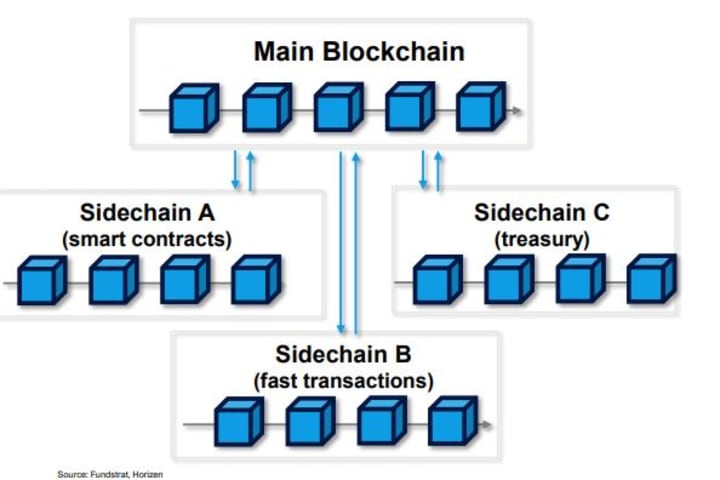Part 2: Blockchain's not so bright side.
The mystery of why blockchain tech has not been adopted, yet...

In the previous piece, I concluded that Btc and crypto are the main usages that blockchain has had in recent years due to its innovative way of storing value and, as this 2020 crisis has shown us, a hedge against inflation due to increased monetary supply plus the investment of big Financial giants such as Jp. Now, in this piece, I'm going to please those who disbelieve in BTC, blockchain, and Dapp's (decentralized applications henceforth.); since blockchain, like all technologies, has a dark side and a gray side. This also depends on medium and long-term solutions that the technology is aiming to provide since many grounds for the technology that revolutionized the monetary and traditional assets in 2009 has still undisclosed its potential.
THE DARK AND BRIGHT SIDE...
1) Misfortune of the non-knowledgeable people...
With the bull market rising in 2017, many felt compelled and fascinated by this new trending technology that only was known in certain circles and was labeled as shady means of exchanging and laundering drug money, a new ''coin'' that has been wandering through cyberspace and was similar to cash. The period from 2015, initiating with the prosecution and advancement of the infamous silk road case in previous years gave BTC and crypto a spotligth (although not an entirely good one)in mainstream media and social media.
This drove people who in those years started investing and finding on crypto/blockchain a safe haven for banking, creating wealth; but since this a relatively new asset, bad people were lurking around this rise of the crypto world and we saw another infamous business which tainted the technology. A popularized new method of financing projects was the ICO (initial coin offerings) in which certain business who intended to seek financial liquidity created their own coins; with the rise of Ethereum, the second-largest coin, crypto enthusiast found a way of creating their own applications, specifically, DAPP's and investors could reach a more dynamic way of owning a share f the new app's company by buying this new application coins created on the 2nd revolutionary blockchain brought us; which is the ability to create new applications with a decentralized essence on the Ethereum chain, mainly using Smart contracts, this was the birth of a new era of not only storing value, but finding money to fund a venture without the regular OTC/regulated market roadblocks, yet for the unfortunate not so knowers of the technology, reality would be struck...
Many were the ones from 2015 to 2017 to fall under many scams of the ICO rise up, people who were trying to venture into the crypto world fall under many of the ''ICO's'' that in reality turned out to be blatant scams; even with the knowledge of ETH and BTC the ecosystem at the time was more of a wild west; were tracing a transfer of a crypto-asset to a coin (or bank funds) was hardly discernible, mainly because both the legit ICOS and scam ICOS used the same base to create the wallets used to fund their endeavors: ERC20. This is basically the format in which ETH allowed to use its ledger as a base for creating wallets and applications of your own in which you could power (or gas) your smart contract apps; this sidechain revolution allowed to gave access to people all around the world, and exchanges were popularized as shown on the below image:

This image shows, in a nutshell, the real underlying reason for the ICO/crypto rise in 2017; not only you could store value in a non-centralized asset, but also you could own part of a decentralized application by buying the ICO, some of them gave you equity of investment, not only value; which meant an investor could collect dividends, moreover, some of them even gave you the power to vote in a new system of corporate governance called DAO(decentralized autonomous organizations; or basically a smart contract) in which ICO holders could bear decision powers in regards of the governance of the project, without a traditional presence in a regular LLC gathering of shareholders, thus giving birth to a network-based model of operating business.
2) The gray-Bright future
A) Bright if regulators were not politically cost-effective driven.
oThis enacted several jurisdictions reforms in Delaware, which enabled LLC's to gather their account information in regards to be stored in a blockchain ledger; enabling the door towards an acceptance of the other solutions that it might ironically give a benefit towards the people BTC was created in the beginning to run away from. By consensus algorithm and timestamp blockchain could provide as a method of keeping verified data; in which the recoding if the transaction could pose an entrance on beginnings to change not just the incorporation business, but the general public policy sector; where on the judicial systems, the contract could save millions of dollar in commercial disagreements disputes to the judicial system, where a smart contract would automatically settle a home purchase by serving as an escrow to receive funds; process the property deed modification and if any disagreement occurs upon that transaction, the judge of the said case could have an expedited way to resolve the matter by reading the terms embedded upon a smart contract store on a public/private blockchain ledger.
Nonetheless, it seems that regulators have been reluctant due to the unwillingness of their own policymakers to take this solutions blockchain provides since its a dangerous tool that may simplify the act of government, but also it would stifle their crooked ways since transparency is a trait that could not be overlooked by a ledger. Elections, being a case in which by a mere upload of citizen's identity into a blockchain ledger, could not only accelerate the voting process but also provide an end towards fraud in elections. This evidence could be gathered in case of a fraud lawsuit and judges would be able to read the ledger and provide accurate judgment.
All of these solutions are in a gray area since the adoption by parliaments globally are slow, and worsened by the COVID outbreak, since experimenting in an era where people whose livelihoods were challenged by this virus, it would pose a political cost and thus, blockchain adoption into the public sector was delayed until further vaccine...
B) Not a solution for the current set of rules...
From the ''crash'' of 2017 up until 2020, many were discouraged and the hype for the crypto world diminished, even though enthusiasts remained loyal to the holding value of crypto, detractors had an excellent time voicing half ruth, which was the cost of a traditional company to implement blockchain-based solutions, apart from providing exchange and protection of crypto digital assets, and those other technologies like cloud-based technology or data-driven decisions for marketing were more cost-efficient solutions towards companies since blockchain lacked the ability to give info that marketers needed to perform data-driven campaigns and that its storage usage was slow, given the scalability problems blockchain had, compared to cloud information.
All of this true, except for the fact that all of those analyses were performed taking into account a centralized business model, which now pertains in the high-end tech companies, where the data harvest is perfome¡d in a platform-based business model, where a user by its activity obtains the benefit of connecting to the service provider (uber, doordash, social media) thus flooding the user with unwanted ads, with info sold to third parties, meaning the companies who then place ads inside the platform. Just as seen on the model posted on the image of this article; where the usage of both providers and users ends up in a centralized entity which regulates by terms and conditions the information of the members who agree to use their tools, companies, and platform models have no use of blockchain infrastructure.
Whereas network base models are now the next disruption, which also falls into a grey area. Blockchain is reinventing its usage now by creating value in replicating network-based models in which the user can build its own application, and companies can set up their own type of data gathering, exchange of goods via e-commerce, and getting rid once and for all of a centralized entity, but using an ecosystem of networks which by usage all of the members get rewarded and could benefit of the data traffic by personalizing their environments and inviting peers to use an alternative. The banning of the 45th US president may have accelerated this by incentivizing people whose interest is not to pertain anymore to terms and conditions of the big tech corps, But to specialize in a reward-personalized environment in which the network allows you to create the terms, the empowerment of the user and provider, and not to be subjected to a centralized authority.
Again, this is a gray area, since the adoption of alternatives to e-commerce giants like Amazon or social media giants like Facebook/Instagram will surface gradually, and new applications and DAPP solutions in which decentralized systems are surging to provide an option to the big tech status quo as a disruption of a model that you, the user and/or provider are the product, but also a shareholder whose usage of the reward-based network personalizes your digital space, hence creating a new experience.
About the Creator
Samu Anguizola
Just a FINTECH; tech in general entusiast; geek to the core and passionate about politics. Just writing in order to reinvent mein this everlasting world.
Tech, politics, business and economics your topics? You are in the right place!






Comments
There are no comments for this story
Be the first to respond and start the conversation.